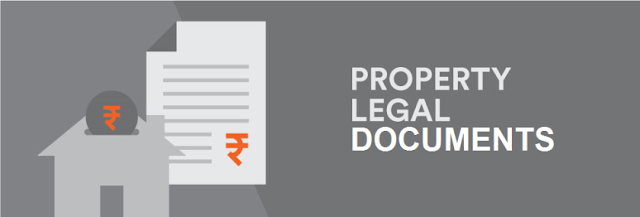 Buying real estate property can be an expensive affair and it is next to impossible to buy a house without financial assistance. It is therefore necessary to take precautions and ensure that the hard earned money invested into such property is not only safe but secured to the fullest extent. This highlights the need for a proper due diligence. Also, a purchaser needs to be aware of the following the basic legal documents before purchasing an immovable property:
Buying real estate property can be an expensive affair and it is next to impossible to buy a house without financial assistance. It is therefore necessary to take precautions and ensure that the hard earned money invested into such property is not only safe but secured to the fullest extent. This highlights the need for a proper due diligence. Also, a purchaser needs to be aware of the following the basic legal documents before purchasing an immovable property:1. Original Title Documents
The title documents means the flow of title devolution from one owner to another and culminating with the current owner/ seller who is selling the property. In case the original title documents are not with the seller, then there are chances that the title documents are deposited with the banks/ financial institution for the purpose of creation of mortgage and the same also needs to be verified by the purchaser.
2. Search Report
The title search report is usually issued by the search clerk after conducting searches in the offices of the concerned sub-registrar of assurances, to verify the entries on record in relation to the subject property, and by virtue of that, one can trace of the flow/ devolution of title as mentioned aforesaid. Additionally, the search clerk also reports, as to whether there is any Lis Pendens (pending litigation) notice registered with the office of concerned sub-registrar of assurances.
3. Title Certificate
Title Certificate is issued by an Advocate based on the Title Search Report and the title documents verified by the Advocate in respect of the subject property. The Advocate should ideally also search in the concerned Courts as to whether any litigation is pending in relation to the subject property. Such a certificate should also cover the claims, if any received, in response to the public notice issued in the local newspapers, to be published, one in English and other in the Regional language.
4. No Due Certificate
No Due Certificate is issued by banks/ financial institution after repayment of the loan and clearance of charge/ mortgage by the banks/ financial institution, so as to rule out any claims by the Banks and to assure that the subject property is free from encumbrance.
5. Sanctioned Layout Plans
It means the layout plans of the structure, which has been duly sanctioned/ approved by the concerned competent authority including the municipal corporation. In case the subject structure is not in terms of the sanctioned layout plans, then it is not advisable to purchase such property, since it is a clear indication of violation of the sanctioned layout plans and applicable laws.
6. Occupation Certificate
The occupation certificate is issued by the corporation, certifying that the subject property/ structures constructed upto relevant floors of the building, can be occupied by the purchaser. This indicates that the developer/ erstwhile owner/ seller has constructed the structure in terms of the sanctioned layout plans and has also complied with various other building norms and obligations.
7. Bills and Receipts
Latest Property Tax bills, Electricity bills, maintenance bills together with the paid receipts should be verified, since the same clarifies about the arrears, if any, in relation to the subject property.
8. For Purchase of Land
In case of purchase of land, in addition to some of the above mentioned documents, one must also verify
(i) 7/12 Extracts: This document indicates the name of the owner, name of the person having other rights such as, lessee/ mortgagee, the area admeasurements and cultivation in the land, and/ or
(ii) Mutation Entries: This document records entries regarding devolution of title in relation to the subject property.












